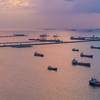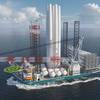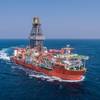British and German warships made ready to sail for waters off Libya as Europe ramped up rescue operations in the Mediterranean after up to 900 desperate migrants drowned last weekend on a boat heading for Italy.
Yet hours after European Union leaders agreed in Brussels on Thursday to treble funding for EU maritime missions and pledged more ships and aircraft, 14 clandestine migrants were killed when a train ploughed into dozens of Somalis and Afghans making their way in darkness along a rail track in a Macedonian gorge.
The incident highlighted the variety of routes that growing numbers are taking to escape war and poverty in Asia, Africa and the Middle East and chance their luck in a wealthy region that offers, at best, a chilly welcome. EU governments remain deeply at odds over how to share out the care of those who make it.
After the sinking of a packed fishing vessel last weekend nearly doubled the death toll at sea this year to almost 2,000, EU leaders responded to a public outcry by reversing sharp cuts in search and rescue operations -- though voters' wariness of immigration means few are willing to take in many more refugees.
Britain's helicopter-carrying flagship Bulwark, currently near Istanbul, will head for the area between Libya and Italy on Sunday, the government said. However, Prime Minister David Cameron, who faces a threat from anti-immigration populists as he seeks re-election in less than two weeks, stressed when he offered it on Thursday that few of those rescued would come to Britain.
Germany, favoured destination for many migrants who make it to Europe, said on Friday it would have a frigate and a supply vessel in the area within days to comb the sea for refugees.
Nearly 40,000 have made it to Italy so far this year, though Germany and its neighbours complain that Italy and Greece do too little to track those who arrive and then swiftly head north.
EU border agency Frontex says 276,000 people entered the bloc illegally last year, more than double the number in 2013. Sea crossings to Italy quadrupled to 170,000 as anarchy in Libya opened opportunities for people smuggling gangs. Some 43,000 came into the EU last year via the Balkans but 32,000 arrived in just the first three months of this year, Frontex data shows.
Death on the Railway
Near the Macedonian town of Veles, a Reuters photographer saw body parts, clothing and food strewn along a remote stretch of rail line beside a river on Friday -- part of a migrant route that stretches back thousands of miles into places of war and hunger and on toward Germany and Europe's prosperous north.
"The train was unable to stop before hitting and running over some of them," said a prosecutor. About 50 people, mostly from Somalia and Afghanistan, had been on the track, he added.
The United Nations, which was critical of the EU response off Libya, welcomed the summit decision that EU officials said will effectively restore the same level of help as a mission run by Italy which picked up over 100,000 last year but which was replaced by a more modest EU-run operation last October.
But the U.N. refugee agency also urged Europe to make it easier for people to seek EU protection without making hazardous journeys. EU leaders agreed to look into ways to offer more access to its asylum and immigration procedures outside Europe.
"Ultimately the test will be whether we see reduction in lives lost, effective access to protection in Europe without having to cross the Mediterranean and an effective Common European Asylum System, which truly lives up to its commitments of solidarity," UNHCR spokesman Adrian Edwards said.
Charity Save the Children said it was concerned that adding more ships to Frontex's Operation Triton off the Italian coast would not save more lives if the mission were not extended much further out toward the Libyan coast 300 miles away -- where Italy's own Mare Nostrum mission did much of its work last year.
Such an extension is the prerogative of Frontex, consulting with the operation's Italian hosts. Those consultations are under way and Frontex Executive Director Fabrice Leggeri said in a statement that the greater forces would mean a "significant expansion of our operations in the Mediterranean".
Italian and EU officials said a broader area of operations, bolstered by more air cover, was likely in the coming days.
Court Hearing
In the Sicilian port of Catania, the presumed captain of the migrant boat that sank appeared before an Italian judge on Friday after prosecutors asked for a charge of homicide.
Mohammed Ali Malek, 27, has denied that he was in charge of the heavily overloaded fishing boat that capsized with hundreds of African and Bangladeshi migrants locked in its lower decks.
"He says he's a migrant like all the others and he paid his fare to go on the boat," his lawyer said. The Tunisian showed little emotion as the preliminary hearing began behind closed doors. A 25-year-old Syrian, Mahmud Bikhit, who prosecutors believe was a crew member, has accused Malek of being in charge of the vessel when it collided with a merchant ship coming to its aid and capsized. Bikhit denied being a crew member.
Only 28 people survived the disaster, believed to be the heaviest loss of life on the Mediterranean in decades.
European leaders acknowledge there is no total solution for a problem that is partly driven by the huge gulf in incomes and living standards between populations divided by short stretches of sea. In the coming weeks they will discuss ways of limiting the flows along the most dangerous routes, including tightening Libya's African borders and targeting development aid.
Italian Prime Minister Matteo Renzi persuaded the other 27 leaders on Thursday to back a proposal to "capture and destroy" boats that are about to be used by traffickers, though how that would be done and how soon is still unclear.
EU officials said the bloc's Italian foreign policy chief Federica Mogherini would explore the possibility of securing a Security Council mandate for such attacks when she visits the United Nations in New York next week. Council members Britain and France offered to support such efforts. But veto-wielding Russia may not cooperate, given the confrontation over Ukraine.
(By Alastair Macdonald and Kole Casule; Additional reporting by Francesco Guarascio, Antonella Cinelli, Sabine Siebold, James Mackenzie, Ognen Teofilovski, Macedonia, Tom Miles and Stephanie Nebehay; Writing by Alastair Macdonald; Editing by Sophie Walker)










